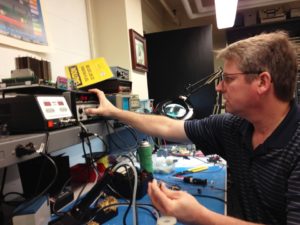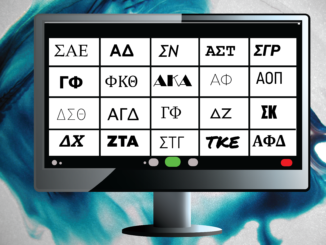
Dan Bodnar, manager of instrument maintenance in the Bayer school, tests a broken capacitor taken from the carillon bell control unit in the Administration Building.
Brandon Addeo | News Editor
You might not have noticed it, but a familiar sound briefly disappeared from Duquesne’s campus.
The campus’ carillon bell system, which rings the time from the chapel’s steeple every hour, gives a short chime every 15 minutes and notifies churchgoers of the start of masses, suddenly stopped working at the start of the school year.
On Wednesday around 2:30 p.m., workers from Duquesne Computing and Technology Services managed to get the bells up and running again, according to CTS Computing Support Service Director Don Maue.
The issue was a blown-out capacitor in the bell’s control system, Maue said. While the exact cause of the capacitor blowout is not known, it could have been the result of a lightning strike, or simply because the system is old.
According to Bill Zilcosky, director of building services at Duquesne, the carillon bells were installed during a steeple renovation which was completed in 1996.
Since then, they’ve become a staple of life at Duquesne. Maue said he uses the bells to help guide people trying to find Old Main.
“I’ll always say, ‘go out on campus and wait 14 minutes, and when you hear the bells walk toward the bells,’” Maue said.
The bells, which are not physical bells in the traditional sense, are set on an automated timer from a twenty-one year-old control unit which sits in a room on the second floor of Old Main, Maue said. Preset recordings are input into the control unit, which are sent through cables and an amplifier to speakers at the top of the chapel.
While some students might not have noticed the lack of bells in the air, campus ministers realized quickly.
Rev. Dan Walsh, a Spiritan priest at Duquesne, first noticed while sitting in the Laval House one morning with the other Spiritan priests.
“[The bells] tell us when to begin our morning prayer,” Walsh said.
When no bells came at the usual time of 7:30 a.m., Walsh looked at his wristwatch and realized something was wrong.
Since then, he and other Spiritans have been forced to rely on wristwatches and smartphone clocks to tell the time for their daily prayers and when to begin masses.
“It’s amazing how we get kind of accustomed to [hearing the bells chime],” Walsh said.
Walsh added that staff in the administration building have accidentally stayed late at work because the bells marked when it was their time to leave.
Walsh first considered sending the bell’s control unit back to its manufacturer, Verdin, based out of Cincinnati. The company asked for a $250 fee for Duquesne to send the unit to them to determine the problem and if it could be fixed.
After Maue discovered the faulty capacitor, the price tag for repairs dropped to $1.58 for CTS to buy two replacement capacitors.
Now that the repairs are complete, Walsh and Maue are considering upgrading the old analogue carillon system to a new digital one — potentially one which can be remotely operated from an iPad.
“Father Walsh is a big Pirates fan, he can be at a Pirate game … [if] somebody hits a grand slam home run, he can ring the bells at Duquesne,” Maue said with a laugh.



